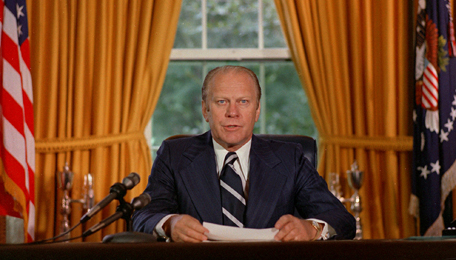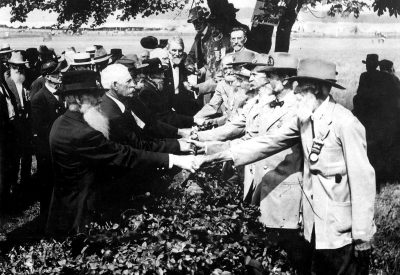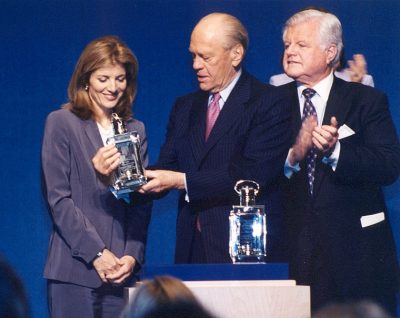“[W]hen the president does it, that means it is not illegal.” – Richard Nixon to David Frost, 1977
The “president cannot obstruct justice because he is the chief law enforcement officer under [the Constitution’s Article II] and has every right to express his view of any case.” – John Dowd, Counsel to Donald Trump, December 4, 2017

President Gerald Ford announces his pardon of Richard Nixon.
On September 8, 1974, President Gerald Ford issued a proclamation pardoning his predecessor, Richard Nixon, “for all offenses against the United States which he, Richard Nixon, has committed or may have committed or taken part in during the period” in which he was President of the United States.
The pardon of Richard Nixon brought to an abrupt end the brief honeymoon period that Ford had received from the press and public in the month after he had assumed the presidency on August 9, 1974. J.F. terHorst, Ford’s Press Secretary, abruptly quit in protest to the pardon. In Congress, Democrats, who nearly universally condemned the move, were even joined in their opposition by a handful of Republicans. “Far from writing ‘The End’ on the tragedy of Watergate,” the New York Times editorialized on September 10, 1974, “President Ford’s sweeping pardon of former President Nixon has only muddied further the ambiguities and uncertainties left in the wake of that whole lamentable episode. A more divisive and distasteful outcome could scarcely be imagined.” Given the closeness of the 1976 presidential election, a case can be made that the pardon cost Ford reelection.
But over the course of the next quarter century, opinion about the pardon among the media and even Democratic politicians entirely flipped. In 2001, the Kennedy Presidential Library celebrated the pardon by granting President Ford a Profile in Courage Award. “Unlike many of us at the time,” Senator Ted Kennedy noted at the ceremony
President Ford recognized that the nation had to move forward, and could not do so if there was a continuing effort to prosecute former President Nixon. So President Ford made a courageous decision, one that historians now say cost him his office, and he pardoned Richard Nixon.
I was one of those who spoke out against his action then. But time has a way of clarifying past events, and now we see that President Ford was right. His courage and dedication to our country made it possible for us to begin the process of healing and put the tragedy of Watergate behind us. He eminently deserves this award, and we are proud of his achievement.
When Gerald Ford passed away a little over five years later, the pardon again came in for praise. The New York Times had entirely revised its view at the time that the pardon was “divisive and distasteful.” “The pardon, intensely unpopular at the time, came to be generally viewed as correct,” the Times‘s obituary for Ford declared. Despite the national outcry at the time, the Times endorsed Ford’s own assessment in his 1979 autobiography A Time to Heal: “all of the healing process that I thought was so essential would have been much more difficult to achieve” without the pardon.

Civil War Veterans Shake Hands at the Fiftieth Anniversary of the Battle of Gettysburg
Americans love tales of national reconciliation. But reconciliation can mask unfinished political business. This has most spectacularly been the case with Civil War memory. After the collapse of Reconstruction in the 1870s, white, Northern elites were generally happy to embrace notions of national reconciliation, even if the cost involved largely accepting neo-Confederate stories about the origins of the Civil War and a return to forms of white supremacy almost as vicious as slavery itself. As the recent conflicts over Confederate memorials suggest, this struggle over Civil War memory is far from over even today.
In the speech he gave upon becoming president, Gerald Ford himself invoked Lincoln’s Second Inaugural Address and the end of the Civil War, declaring that it was time for the nation to “bind up the internal wounds of Watergate.” But, like the aftermath of the Civil War, the reconciliation that seemingly brought Watergate to an end came at a cost, though one I think too many Americans are only beginning to see again this year.

Ford Receives a Profile in Courage Award from the JFK Library
Unindicted, pardoned, and free, Richard M. Nixon spent the last decades of his life making excuses for his criminal activities and reestablishing himself as an elder statesman. The 1977 interviews with David Frost were, in many ways, the coming-out party for this final New Nixon. The American people in general – and the Republican Party in particular — never entirely grappled with Nixon’s criminality.
And now we find ourselves with a President whose lawyer repeats the Nixonian claim that the President is above the law.
Just as Radical Republicans of the late 1860s and early 1870s grasped what had to be done to complete the task of ridding this nation of slavery and treason, the many critics of Ford’s pardon of Nixon got it right at the time: any “healing” worthy of its name had to involve convicting Richard Nixon of the crimes he committed as president and sending him to prison.
The supposed healing we got instead left much of the cancer that had overtaken the Nixon White House untouched. Now that it has metastasized again, we need to reconsider that overly comfortable consensus about the Nixon pardon that has dominated American memory of it over the last several decades.

2 Thoughts on this Post
S-USIH Comment Policy
We ask that those who participate in the discussions generated in the Comments section do so with the same decorum as they would in any other academic setting or context. Since the USIH bloggers write under our real names, we would prefer that our commenters also identify themselves by their real name. As our primary goal is to stimulate and engage in fruitful and productive discussion, ad hominem attacks (personal or professional), unnecessary insults, and/or mean-spiritedness have no place in the USIH Blog’s Comments section. Therefore, we reserve the right to remove any comments that contain any of the above and/or are not intended to further the discussion of the topic of the post. We welcome suggestions for corrections to any of our posts. As the official blog of the Society of US Intellectual History, we hope to foster a diverse community of scholars and readers who engage with one another in discussions of US intellectual history, broadly understood.
You skipped over Dear Leader, Barack Obama, and his own “look forward” and refusal to prosecute war crimes — or bankster crimes, for that matter.
It occurs to me after reading this post that the question of what exactly would have happened had Ford not pardoned Nixon might make an interesting addition to the mini-genre of novels based on counterfactuals (e.g., what would have happened or what would the world look like if…). Clearly the novelist would have to do a fair amount of legal and historical research.
I wonder whether Nixon really believed what he told Frost (“when the President does it, that means it’s not illegal”) or whether Nixon knew that obstructing justice etc. was illegal and thought he somehow could get away with it. Watergate probably couldn’t have happened without the blend of Nixon’s paranoia, fear of the revelation of past crimes/transgressions (e.g., the clandestine interference with the peace negotiations just before the ’68 elections), plus his and Kissinger’s exaggerated idea of the world-historical significance of their foreign policy, which in Nixon’s mind seems to have justified any moves, however illegal, against his opponents. Although Nixon periodically reinvented his public persona, the view of his critics was that there was always only one Nixon, a view expressed by the title of Frank Mankiewicz’s book Perfectly Clear: Nixon from Whittier to Watergate.